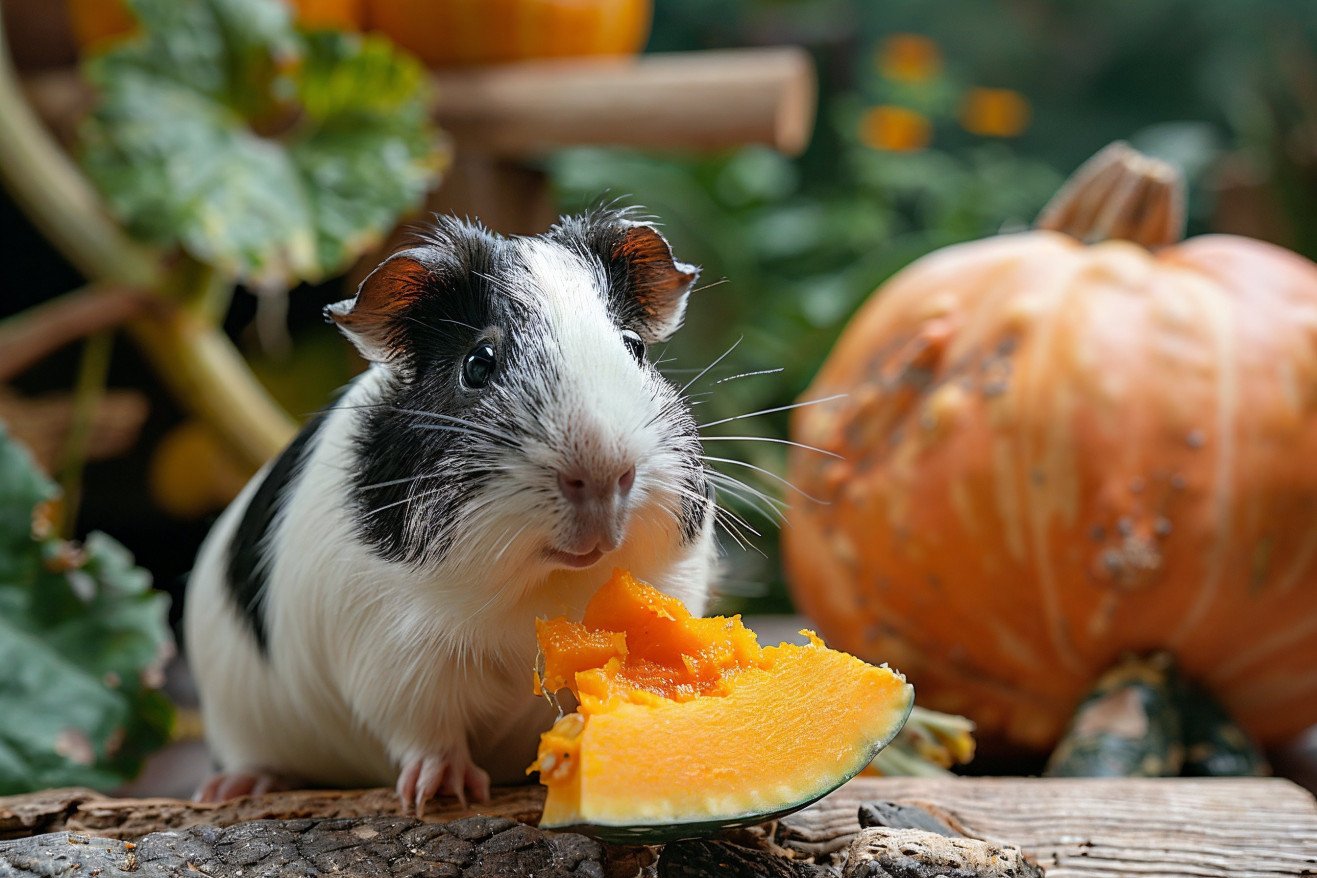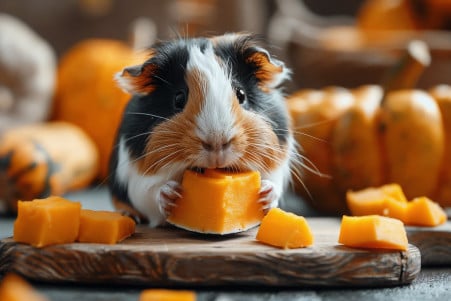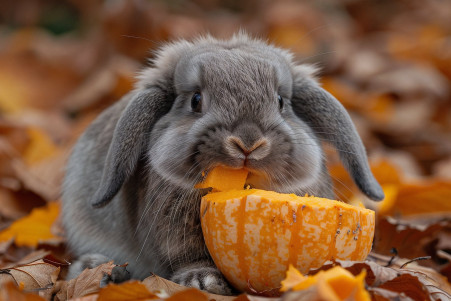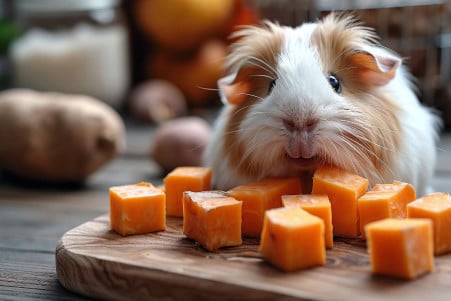Can Guinea Pigs Eat Pumpkin? Nutritional Benefits and Feeding Tips
23 February 2024 • Updated 21 February 2024

Pumpkins are a staple of the fall season, but can they also be a nutritious addition to your guinea pig’s diet? The good news is that guinea pigs can have pumpkin as a treat because it is full of vitamins and fiber.
However, you will want to make sure you’re feeding them small, seedless pieces of fresh pumpkin only every so often—no more than twice a week—to prevent digestive upset and too much sugar.
This article will discuss the pros and cons of feeding pumpkin to guinea pigs based on veterinary nutrition and animal welfare research. It will also cover research on guinea pig nutrition and digestive issues.
Research on the nutritional benefits of pumpkin for other animals will also be included. By looking at this research, you will get a good idea of where pumpkin fits into a guinea pig’s diet and how to make sure you’re feeding it to them responsibly.
Can guinea pigs eat pumpkin?
Nutritional Value of Pumpkin for Guinea Pigs
Pumpkin is packed with vitamins and fiber, so it can be a great addition to your guinea pig’s diet.
A 100g serving of raw pumpkin has about 5.7g of vitamin A from beta carotene, which can help support eye and skin health in guinea pigs.
While pumpkin doesn’t have much vitamin C, which is important for guinea pigs because they can’t produce it on their own, it can help ensure a well-rounded diet when fed in moderation. An article by PetKeen explains that it’s important to make sure your guinea pig’s diet includes high-fiber foods like pumpkin to help with digestion and prevent problems like bladder stones.
PawMaw suggests starting with a small piece of pumpkin that’s about an inch in size as the best serving size for a guinea pig. This can be increased gradually up to three times a week to help your pet avoid digestive issues from the water content in the pumpkin.
To keep the pumpkin safe and ensure it retains its nutrients, it should be served raw and after being washed thoroughly. However, an article by PetKeen warns that pumpkin can be harmful if it’s overfed to guinea pigs because it contains sugar, which can lead to obesity and dental problems.
As long as you’re careful about the serving size and how often you give it to your pet, you can feel good about adding pumpkin to your guinea pig’s diet and know that you’re helping to meet their nutritional needs.
Key Nutrients for a Healthy Guinea Pig
Guinea pigs need a lot of fiber in their diet and they also need vitamin C every day because they can’t make it themselves. The Humane Society of the United States says that a good diet for guinea pigs should be made up mostly of hay, which helps with digestion and keeps their teeth healthy.
Timothy hay is best for adults, while alfalfa hay is better for younger guinea pigs because it has more calcium. In addition to hay, about 1/8 cup of vitamin C–fortified pellets a day is a big help in meeting their nutritional needs.
It’s also important to feed them vegetables, which provide important vitamins. Leafy greens and bell peppers are good daily choices because they’re high in vitamin C.
The VCA Animal Hospital says that you should introduce fresh vegetables to your guinea pig’s diet slowly to avoid stomach issues. That said, new treats like pumpkin can be introduced slowly and, if they’re well-tolerated, can be a good addition to their diet. The fiber in pumpkin is good for guinea pigs, but you should make sure to introduce it slowly to avoid stomach issues.
How the Digestive System Works in Guinea Pigs and Common Health Problems
The guinea pig’s digestive system is well-suited for breaking down fibrous plant material. This starts with the guinea pig’s continuously growing incisors and molars, which help break down tough plant matter. After the guinea pig eats, the food goes through a system that includes the stomach and a specialized large intestine, where a microbe-rich caecum helps digest fiber, according to zooplus Magazine.
Common digestive problems in guinea pigs include diarrhea, malocclusion (teeth that don’t line up properly), and vitamin C deficiency, which can result in scurvy. These conditions are often the result of an unbalanced diet or stress. Merck Veterinary Manual explains that guinea pigs are particularly sensitive to changes in their diet and can experience digestive upset if their diet changes too suddenly, so it’s important to maintain a consistent diet.
As a result, a balanced diet is essential for guinea pig health and should consist of a combination of hay, vegetables, and fortified pellets.
Pumpkin, as a source of dietary fiber, can be helpful if it’s introduced slowly and fed in moderation.
The fiber in pumpkin, as Supreme Petfoods explains, is consistent with the high-fiber plant material guinea pigs need, which is important for supporting their digestive system and helping to prevent common health problems. However, it’s important to make sure that the pumpkin is fresh, clean, and fed in appropriate amounts to ensure that it helps the guinea pig’s health without causing digestive problems.
Mindful Munching: How to Add Pumpkin to Your Guinea Pig’s Diet
Of course, adding pumpkin to your guinea pig’s diet should be done with care. First, make sure to wash the pumpkin thoroughly to get rid of any pesticides. Then, as the Guinea Pig Academy suggests, start by adding a small amount of pumpkin to your guinea pig’s diet.
This can be done by giving them small, seedless pieces of pumpkin that are no more than an inch long a few times a month. This way, you can make sure that your guinea pig doesn’t have any negative reactions to the pumpkin, like bloating or diarrhea.
When you’re preparing the pumpkin, make sure to remove the seeds to prevent your guinea pig from choking on them. Also, make sure to scoop out the stringy pulp, which your guinea pig can eat as long as it’s seedless.
Plus, as Petsolino notes, it’s best to feed your guinea pig raw pumpkin so that they can get all of the nutrients without any of the sugar or other additives that can be found in cooked pumpkin.
After you feed your guinea pig pumpkin, make sure to watch them to see if they have any negative reactions. If they do, make sure to take the pumpkin out of their diet.
Also, as PawMaw points out, make sure to give your guinea pig a variety of vegetables in addition to pumpkin so that they get all of the vitamins and fiber that they need to stay healthy. By mixing in treats with staples, you can make sure that your guinea pig gets the nutrition that they need while still keeping things interesting for them.
Other Animals That Can Benefit From Pumpkin
The health effects of pumpkin are not just limited to guinea pigs; they have been researched in a variety of animals. Pumpkin is known for its nutritional and bioactive properties, which can improve animal health and product quality, according to a study in PMC.
The food industry often throws away pumpkin waste, but it could be used as a sustainable feed option that would add antioxidants and essential nutrients to animal diets without taking away from human food supplies.
In addition, research in the Journal of Animal Physiology and Animal Nutrition has shown that pumpkins can have positive effects on poultry, including improving their welfare. The addition of pumpkin to animal feed can also help with weight control, growth, and immunomodulation.
When comparing guinea pigs to other small animals, it becomes clear that they have similar nutritional requirements, especially when it comes to the fiber that is important for digestive health. The bioactive properties of pumpkins, including carotenoids and fatty acids, can help supplement the diets of poultry and livestock.
As a result, it can be assumed that guinea pigs can benefit from pumpkin when it’s added to their diet in the right way. This kind of integrative animal nutrition is part of the larger move toward sustainable animal agriculture and shows how adaptable pumpkin is as a food source.
In Conclusion: The Pumpkin Perspective on Guinea Pig Nutrition
When given in moderation, guinea pigs can eat pumpkin and benefit from its nutritional properties. Pumpkins are high in vitamin A and fiber, which means that they can help with everything from boosting the immune system to aiding in digestion, but only if they are served raw and in small, seedless portions.
Both Kidadl and PawMaw note that it’s important to make sure that guinea pigs don’t eat too much pumpkin because of the health problems that can arise from the high sugar and calcium levels.
This look at guinea pig nutrition underscores the need to do thorough research and get personalized information from vets. Guinea pig owners are urged to be responsible when it comes to their pets’ diets and to make a commitment to learning more.
A well-rounded diet is important to the health of these adorable animals, and while pumpkin can be a part of that, it should be paired with staples like hay and vitamin C–rich veggies.
In short, remember that responsible pet care is a process that is always enhanced by knowledge and attention. So keep on providing excellent care for your guinea pigs, and don’t forget to offer them a little pumpkin every now and then.


